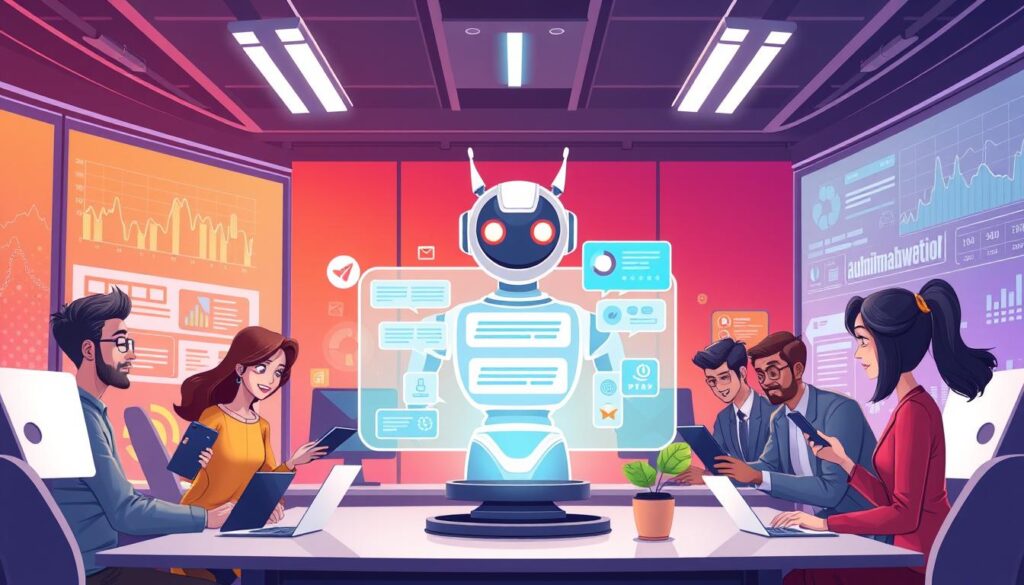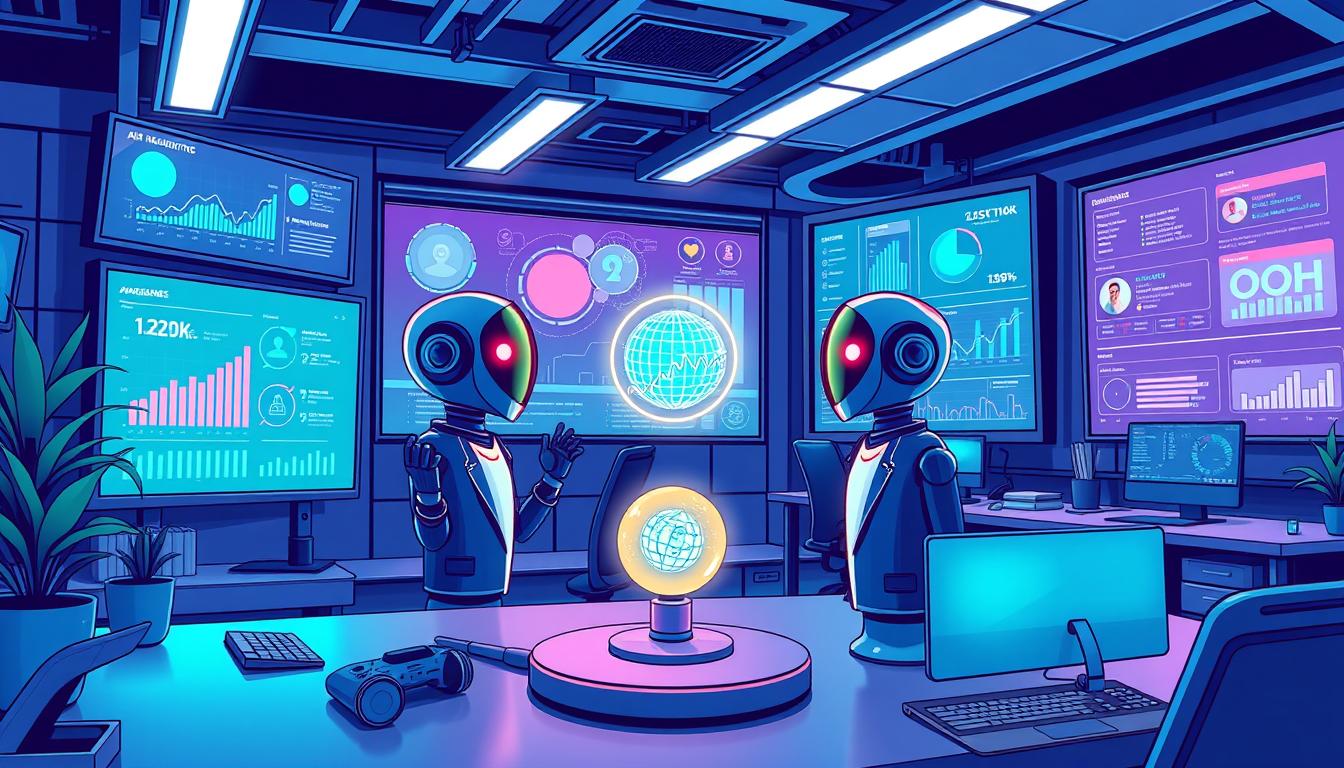AI chatbots are changing marketing by making customer experiences better. They offer 24/7 support and personalize interactions. Using Natural Language Processing (NLP) and machine learning, they understand and respond to human language.
Chatbots are key in conversational marketing, giving quick answers and learning about customer behavior. They’re making industries like e-commerce, financial services, and healthcare better by making things more accessible and efficient. Gartner says by 2025, AI chatbots will handle 85% of customer interactions, showing their big role in marketing.
Understanding AI Chatbots in Marketing: The Next Frontier
The rise of AI customer service tools has brought a new era. This era is all about conversational AI and chatbot technology. These tools can talk like humans, thanks to advanced algorithms.
How we talk to customers has changed a lot. Chatbots have moved from simple rules to smart AI helpers. They understand what we mean and respond in a way that feels natural.
What Sets AI-Powered Chatbots Apart
AI chatbots can get to know us better than ever before. They learn what we like and what we’ve done before. They’re always ready to help, 24/7, making us happier.
Chatbots help a lot in marketing. They can find new leads, help them grow, and turn them into customers. This makes businesses grow faster.
The Evolution of Customer Interaction
AI chatbots work best when they team up with real people. They make talking to companies better and faster. Most businesses use chatbots for simple questions so people can focus on harder stuff.
Natural Language Processing Capabilities
Today’s chatbots can talk in many languages. They help everyone, no matter where they’re from. You can find chatbots on WhatsApp, Messenger, Voice, or Webchat, making it easy to get help.
Chatbots give us useful data to improve our products and services. They make our customers feel special and connected to us. This builds loyalty and a strong bond with our brand.
Essential Benefits of Chatbot Implementation for Marketing Teams
AI-powered chatbots bring many benefits to marketing teams. They change how teams talk to customers and work better. These smart agents give quick and right answers, making customers happy and loyal.
They work all day, every day. This means big brands can help customers anytime, anywhere. It meets the need for fast help from consumers.
Chatbots also make experiences personal by knowing what each customer likes. They learn from talks and use this info to improve experiences. This helps marketers make better choices.
Chatbots are also good for saving money. They handle a lot of customer chats, letting people focus on harder tasks. This saves a lot of money for companies.
Research shows that about 77% of a company’s profit comes from focused efforts. This is thanks to chatbots.
| Benefit | Impact |
|---|---|
| Enhanced Customer Experiences | Quick and accurate responses, boosting satisfaction and loyalty |
| 24/7 Customer Support | Enabling global brands to assist customers anytime, anywhere |
| Personalized Customer Journeys | Tailoring experiences based on individual preferences and behaviors |
| Valuable Insights and Data Collection | Empowering marketers to make more informed decisions |
| Cost-Effective Operations | Handling a significant portion of customer interactions, freeing up human agents |
Chatbots also help with getting and keeping leads. They guide people through the sales process with the right info. As spending on chatbots grows, smart teams use them to lead the way.

Revolutionizing Personalization Through AI-Driven Conversations
In today’s digital world, personalized marketing is key to staying ahead. AI-driven personalization and analyzing customer data are changing how businesses reach out. AI chatbots lead this change, helping marketers craft experiences that truly connect with customers.
Creating Tailored Customer Experiences
Conversational marketing focuses on real conversations, building trust with customers. AI chatbots use machine learning and natural language to make each interaction unique. They understand what customers want and need, offering personalized advice and solutions.
These smart tools watch how users behave, making recommendations that fit their interests. This approach boosts engagement and satisfaction, making customers feel valued.
Predictive Analytics and Customer Insights
AI tools tap into customer data analysis to give marketers valuable insights. Predictive analytics help predict what customers might do next, guiding targeted campaigns. This way, AI personalization improves conversion rates and builds brand loyalty.
It delivers the right message at the right time, making a big difference. Brands like Netflix use AI to suggest content that keeps viewers coming back for more.
Dynamic Content Delivery Systems
AI algorithms sift through data to find out what users like and what they might want next. They adjust content in real-time to match individual interests. This ensures a smooth and engaging experience, boosting user happiness and driving more sales.
Conclusion
AI chatbots are key in today’s marketing world. They offer personalized experiences, boost efficiency, and give valuable insights. They change how brands talk to their audience, providing 24/7 support and making marketing smoother.
As IBM Watson Assistant and other AI tech improve, chatbots will become even more important. They will help with customer engagement and keeping customers happy.
Companies that use AI chatbots do better in meeting customer needs and staying ahead in the digital world. The future of marketing is about using AI to make real, personal connections with customers. Chatbots can increase customer engagement by up to 40% and make marketing 33% more efficient.
As AI chatbots help with sales and lead generation, companies that use them will have a big edge. Chatbots make the customer journey smoother and improve reply rates on messaging apps. This leads to higher conversion rates and a better customer experience.
The future of marketing will be all about combining AI chatbots with other innovations. This will change how brands connect with their audience and keep them ahead of the competition.












